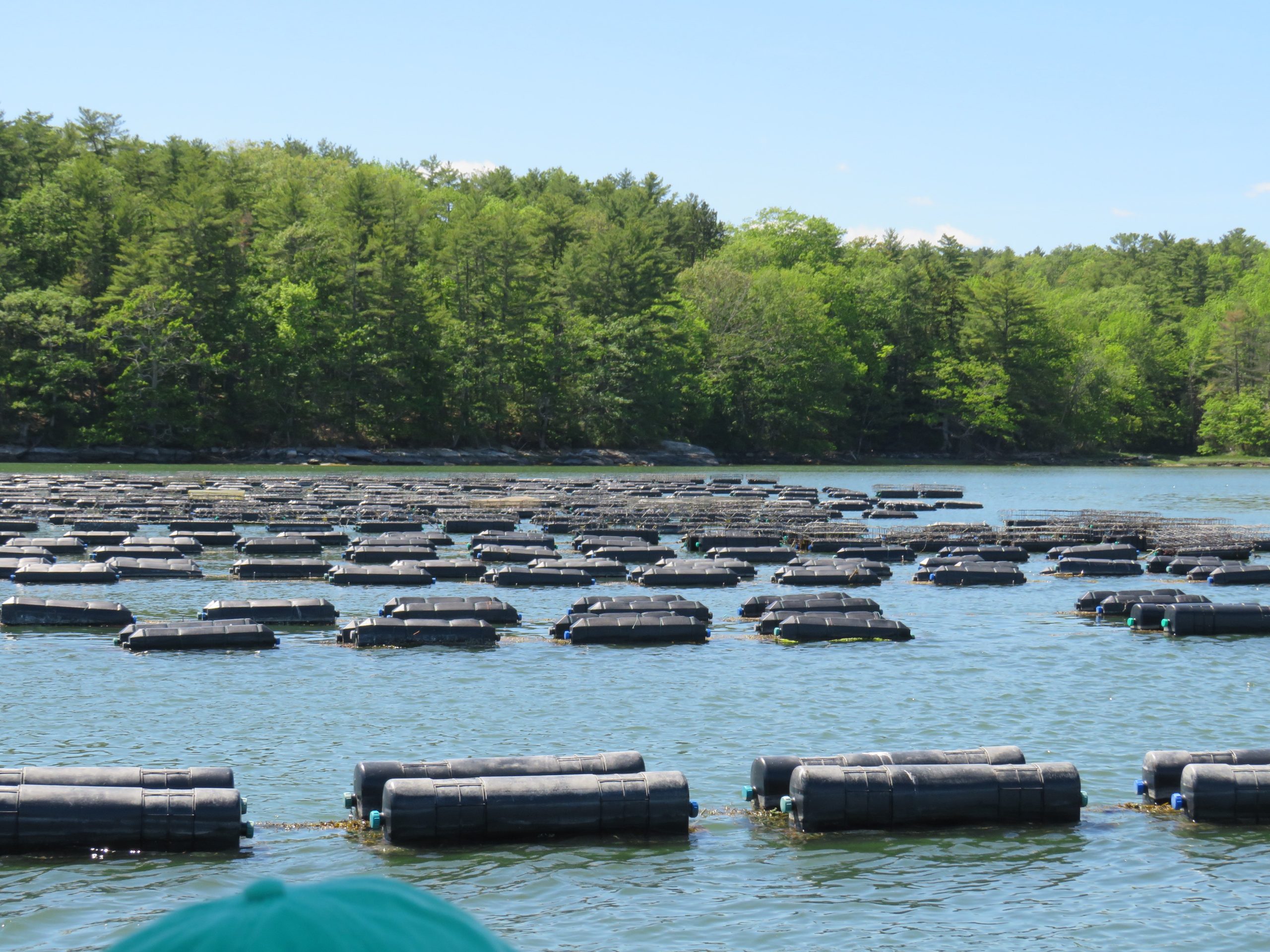
Sustainable Aquaculture in Maine: Research, Innovation, and Workforce Development
Thousands of people made their way to New Orleans last week to celebrate Mardi Gras. While beads and cups filled the streets and the smell of fresh baked beignets warmed the air (though maybe it was just the humidity), representatives of Maine’s aquaculture community gathered in the Crescent City last weekend for a different reason: to highlight sustainable aquaculture in Maine. Aquaculture America, the largest national aquaculture conference, held February 23-26, showcased the incredible research, innovation, and workforce development across Maine’s booming aquaculture sector in a session chaired by Deborah Bouchard and Meggan Dwyer from the Aquaculture Research Institute (ARI).
Speakers from the University of Maine, Educate Maine, The Gulf of Maine Research Institute, Long Cove Sea Farms, Colby College, and the University of New Hampshire demonstrated the multidisciplinary work from UMaine’s microcredential pathway, to using pheromones as a means to control sea lice. The take away from the session was clear; the aquaculture sector in Maine is robust, from the detailed innovation and research to the broader engagement of industry and education.
Workforce development strategy is crucial for the future of Maine’s aquaculture sector. “Creating clear and comprehensive occupational standards, standardizing workforce training across the state, and involving industry to align these trainings with workforce needs is something Maine is doing well,” points out Carissa Maurin with the Gulf of Maine Research Institute. Projects such as the Maine Aquaculture Apprenticeship Program, Aquaculture Pioneers, and the Aquaculture Experiential Opportunities for Undergraduate Students (AquEOUS) are excellent examples of creating critical partnerships between industry leaders, educational institutions, and employers with emphasis on experiential learning and diversifying the workforce.
Understanding Maine’s coastal livelihoods and consumer preferences as they relate to aquaculture are equally as important as workforce development. “Seaweed aquaculture in the United States, particularly in Maine, is expanding. Comprehension of how this industry fits into existing working waterfront communities can provide insight into the potential this industry has to diversify income in rural communities previously reliant on fisheries or other marine jobs,” Jennifer Meredith, Assistant Professor of Economics at Colby College explains. A glimpse into the natural resource economics of seaweed in Maine is part of the larger Coast-Cow-Consumer project with Bigelow Laboratory for Ocean Sciences, looking at Gulf of Maine Seaweeds as a feed additive to lower methane emissions from dairy and beef production. Economic impact of the seaweed industry is also being looked at from a consumer perspective. Qiujie Zheng, Associate Professor of Business Analytics at the University of Maine presented a novel study telling a compelling story of why understanding consumer attitudes towards seaweed and value-added products is crucial for farmers and expanding Maine’s seaweed market. Helping farmers find channels to improve consumer knowledge of seaweed products and educating them on how to prepare seaweed at home easily can begin to break down perceived barriers for those reluctant to experimenting with these value added products.
Aquaculture as it relates to climate change and environmental impact was a common theme amongst presentations as well. Reduced plastics, carbon capture, ropeless gear, and insect meal highlight the innovation, value, and dedication to sustainable aquaculture throughout the state. As microplastics continuously pop up in news headlines, Abby Barrows of Long Cove Sea Farm shed a bit of light articulating what aquaculture could look like without plastics. In collaboration with Sue Van Hook at Smithereen Farm in Pembroke, ME, these women are working to produce environmentally friendly gear that is scalable and comparable in price to what is already available using an unlikely material, mushrooms, to create myco buoys. Gear innovation was also emphasized in Michael Coogan’s research through the University of New Hampshire, looking into ropeless gear technology for offshore bivalve culture. On the seaweed front, Adam St. Gelais, Aquaculture Innovation Specialist with ARI discussed macroalgae carbon dioxide removal through the first of its kind “Life Cycle Sustainability Assessment,” with the integration of both social and economic analysis. “To achieve full sustainability of the seaweed sector, both social and economic impacts must be well understood,” Adam explained. Sustainability of fin fish aquaculture in Maine is on the rise as well. Assistant Professor of Fish Nutrition and Nutrigenomics Michael Habtetsion presented successful results from his research looking into sustainable feed development using insects as an alternative to fish meal for Atlantic salmon.
In conjunction with carving the path toward a more sustainable future industry, researchers in Maine are also working on creative solutions to problems that sometimes arise in aquaculture such as “off-flavor” and sea lice. Bobby Harrington and Bobby Morefield both with the University of Maine ARI are working on innovative solutions to address these issues. Harrington, a research associate at ARI has developed a more effective solution than current methods to test for naturally occurring compounds present in recirculating aquaculture systems which can result in an “off-flavor” of the fish tissue. Morefield, a current PhD candidate presented his work looking at pheromones as means for pest management, with the idea of having a drug free and environmentally friendly means to control for sea-lice in aquaculture systems.
ARI’s session in New Orleans demonstrated Fat Tuesday was not the only thing to be celebrated last week – the expertise of industry, farmers, and researchers, and the success of innovation and workforce development across Maine is definitely worthy of a couple celebratory beads as well. Congregation of these speakers across the aquaculture sector illustrated how well-poised Maine is to strengthen and support successful growth of this industry in the region and at a national level.
Contact: Corinne Noufi corinne.noufi@maine.edu

